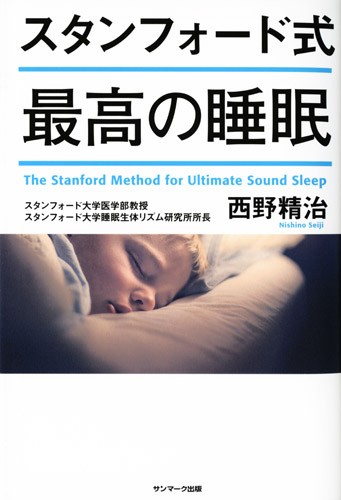


ISBN978-4-7631-3601-5 C0030
251 pages / March 2017 / 1,500 yen (w/o tax)
How to achieve “extreme recovery from exhaustion” based on scientific research done by a Japanese professor at Stanford, the “Mecca of sleep research.”
A leading Japanese professor who currently works at Stanford reveals how to get the best sleep possible in his new book. Stanford, a “sleep research Mecca” which has produced many famous researchers, also has the world’s latest information on sleep. The author, Seiji Nishino, is currently a member of the medical faculty and head of the world’s top sleep research institute there, which consequently makes him an authority on sleep research. “Sleep is more about ‘quality’ than ‘time.’” After nearly 30 years of research, Professor Nishino reveals in this book the best sleeping methods for achieving “extreme recovery from exhaustion” and a “powerful wake-up.” This one book will solve all of your sleep-related problems in one fell swoop, including difficulties with falling asleep, waking up early, and staying awake throughout the day.
Chapter 0 – Physical performance doesn’t rely only on sleeping well Chapter 1 – Why people sleep for one-third of their lives Chapter 2 – The secret “rule of the golden 90 minutes” for night-time sleep Chapter 3 – The Stanford Method for Ultimate Sound Sleep Chapter 4 – The ultimate wake-up strategy that promotes sound sleep according to Stanford Chapter 5 – Those who take control of sleepiness can succeed in life
 Author Seiji Nishino is a world-renowned sleep researcher who is currently a medical professor at Stanford University. I was surprised by many of the facts he shared with me about sleep, but the most surprising to me was: “Even if you sleep as long as you want, curing the effects of sleep deprivation takes three weeks.” This means that staying in bed for 14 hours repeatedly over three weeks will buy you back about 40 minutes of sleep lost from sleep deprivation. But since we can’t always control how long we can stay in bed, this seems unrealistic. You are probably wondering, “Well, then what is the solution?” That solution is waiting for you in this book. The book contains a lot of important new knowledge related to sleep, including what kinds of baths to take to promote sound sleep, what kinds of dreams you shouldn’t be having, what to hold when you’re sleepy to eliminate sleepiness, and what drinks help you sleep!
Author Seiji Nishino is a world-renowned sleep researcher who is currently a medical professor at Stanford University. I was surprised by many of the facts he shared with me about sleep, but the most surprising to me was: “Even if you sleep as long as you want, curing the effects of sleep deprivation takes three weeks.” This means that staying in bed for 14 hours repeatedly over three weeks will buy you back about 40 minutes of sleep lost from sleep deprivation. But since we can’t always control how long we can stay in bed, this seems unrealistic. You are probably wondering, “Well, then what is the solution?” That solution is waiting for you in this book. The book contains a lot of important new knowledge related to sleep, including what kinds of baths to take to promote sound sleep, what kinds of dreams you shouldn’t be having, what to hold when you’re sleepy to eliminate sleepiness, and what drinks help you sleep!
